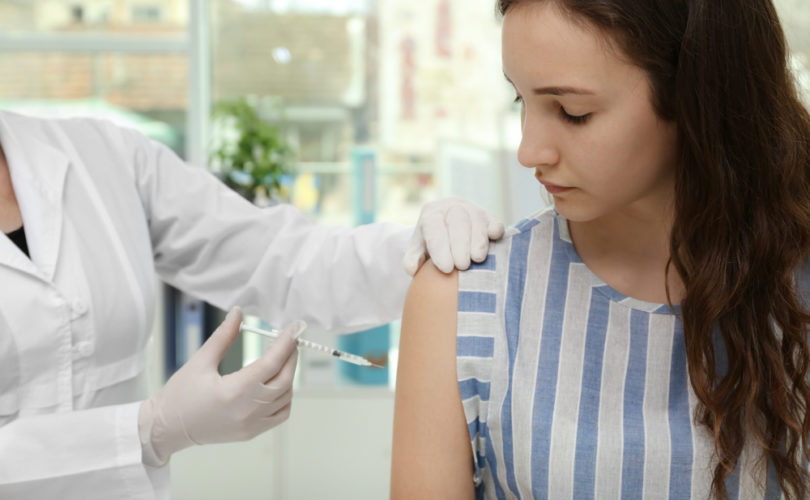June 24, 2021 (LifeSiteNews) — The Food and Drug Administration (FDA) will place a heart inflammation warning label on fact sheets for COVID-19 vaccines made by Pfizer/BioNTech and Moderna, the agency announced on Wednesday.
Dr. Doran Fink, deputy director of the FDA’s vaccine division, told an expert panel of the Centers for Disease Control and Prevention (CDC) that the FDA plans to “move rapidly” to add the new warnings in light of increased reports of post-vaccine heart issues.
The CDC’s Advisory Committee on Immunization Practices (ACIP) convened on Wednesday to discuss data on higher-than-expected cases of heart inflammation among people who received doses of either the Pfizer or Moderna shot, both of which rely on messenger RNA technology. The CDC had planned an emergency meeting to address the reports last week, though that meeting was scrapped due to Juneteenth.
“We do agree that, based on the available data, a warning statement in the fact sheets for both healthcare providers and vaccine recipients and caregivers would be warranted in this situation,” Fink said. “We anticipate that following today’s ACIP meeting we would move rapidly to update the fact sheets with this information,” he added.
The warnings “would likely include information stating that these events have occurred in some vaccine recipients, particularly following dose two of mRNA vaccines, that the onset of symptoms typically have been several days to a week following vaccination,” Fink continued. While “most cases appear to have been associated with resolution of symptoms,” “limited information is available about potential long-term” complications, he noted.
The CDC announced at the ACIP meeting that more than 1,200 cases of heart inflammation following COVID-19 vaccination had been reported to federal authorities as of June 11. The 1,226 reports involve myocarditis, a type of inflammation of the heart muscle, and pericarditis, inflammation of the lining around the heart, according to the CDC. Common symptoms include chest pain, shortness of breath, and heart palpitations.
More than 800 cases of heart inflammation occurred in patients who took a second dose of the Pfizer or Moderna COVID-19 vaccine, while 267 cases were reported after an initial dose. Males made up the vast majority of patients, including 79% of those after dose two, based on data presented by Dr. Tom Shimabukuro, deputy director of the CDC’s vaccine safety office.
Most cases followed use of the Pfizer vaccine, which has received emergency authorization from the FDA for children older than 12. Around 39% of all cases involve individuals under 30 years old, Shimabukuro’s presentation related. Among reports with young people, the CDC identified 323 that meet the agency’s case definition. Nearly all of those cases required hospitalization, and nine patients are still in the hospital.
Reports were submitted to the Vaccine Adverse Event Reporting System, a vaccine injury tracking program run by the FDA and CDC. Experts repeatedly have flagged VAERS, a passive surveillance system, for significantly undercounting injuries, as public commenters stressed at the ACIP meeting.
Dr. Grace Lee, who co-chairs the CDC’s COVID-19 Vaccine Safety Technical Work Group, posited a “likely association” between myocarditis and COVID-19 mRNA vaccines. “Data available to date suggest likely association of myocarditis with mRNA vaccination in adolescents and young adults,” she said on Wednesday, echoing similar findings by Israeli authorities.
“Clinical presentation of myocarditis cases following vaccination has been distinct, occurring most often within one week after dose 2, with chest pain as the most common presentation,” Lee added.
The new data unveiled by the CDC yesterday represents a sharp uptick in reported cases of post-vaccination heart inflammation from just two weeks ago, when the CDC announced that almost 800 cases of myocarditis or pericarditis had been submitted to VAERS through May 31.
Despite the “likely” link between heart inflammation and mRNA vaccines, ACIP said that the current vaccine policy would not change, even for young people, claiming that a risk-benefit analysis still favored the vaccines. Children and young adults have a COVID-19 death rate as low as 0.1%, if not lower, based on CDC estimates.
In April, the FDA recommended a pause on the COVID-19 vaccine made by Johnson & Johnson in response to six cases of blood clotting. The CDC has said that the Johnson & Johnson vaccine, which is especially connected to abortion, does not have a “similar reporting pattern” regarding heart inflammation.
RELATED
Twitter suspends conservative website for reporting on teenager’s post-vaccine death
CDC to hold emergency meeting about heart inflammation after COVID vaccination
Could mRNA vaccines permanently alter DNA? Recent science suggests they might

